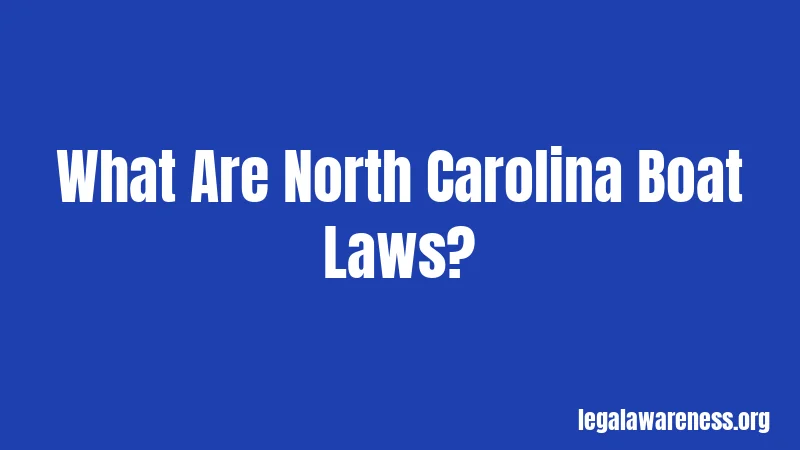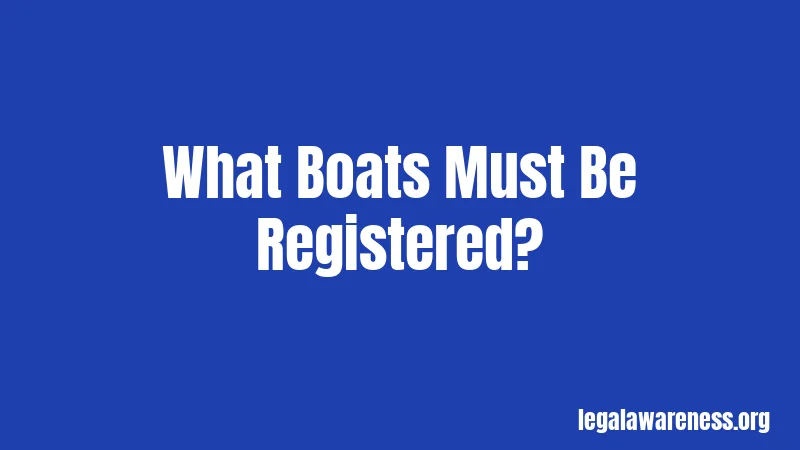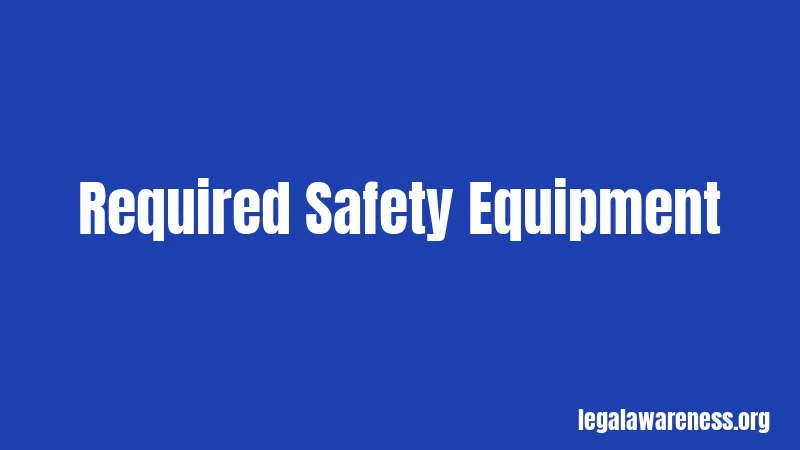Boat Laws in North Carolina (2026): Rules You Can’t Afford to Ignore
Most people think boating laws are pretty simple. Just don’t drink and drive the boat, right?
Wrong. North Carolina has strict rules about everything from registration to safety equipment. The penalties can hit hard if you mess up. Let’s break down exactly what you need to know to stay legal on the water.
What Are North Carolina Boat Laws?

North Carolina boat laws are rules set by the state to keep everyone safe on the water. The North Carolina Wildlife Resources Commission enforces these laws. They cover everything from who can operate a boat to what equipment you need onboard.
These laws apply to all public waterways in the state. That includes lakes, rivers, the Intracoastal Waterway, and coastal waters.
Who Needs a Boater Education Certificate?
Here’s the deal. If you were born on or after January 1, 1988, you need a certificate to operate a boat. This applies to any motorized vessel with 10 horsepower or more.
The certificate is good for life. You just need to complete an approved boating safety course. Many people call this a “boating license,” but it’s technically a Boater Education Certificate.
You must carry this certificate with you whenever you operate a boat. Law enforcement can ask to see it anytime. Not having it can result in a fine.
Wondering if this applies to you? If you were born before 1988, you’re exempt. But taking a safety course is still a smart idea.
What Boats Must Be Registered?

All motorized boats need registration in North Carolina. Personal watercraft like jet skis also require registration. Sailboats 14 feet or longer must be registered too.
Here’s what doesn’t need registration:
- Rowboats, canoes, and kayaks with no motor
- Boats used only on private ponds
- Vessels with valid out-of-state registration for less than 90 days
- Ship lifeboats used only for emergencies
Pretty straightforward.
Registration gives your boat a unique identification number. You’ll get registration decals that go on both sides of the bow. The registration certificate must be onboard whenever you’re operating the vessel.
How Much Does Boat Registration Cost?
Registration fees depend on your boat’s size and how long you want to register. You can choose one year or three years.
For boats under 26 feet with a title:
- One year costs $70
- Three years costs $130
For boats 26 feet or longer with a title:
- One year costs $90
- Three years costs $190
Small boats under 14 feet without a title:
- One year costs $35
- Three years costs $95
Honestly, the three-year option saves you money and hassle. You won’t have to renew as often.
Other fees include $8 for duplicate registration and $35 for duplicate titles.
Required Safety Equipment

Every boat must carry specific safety equipment. Missing gear can result in fines and could literally save your life.
You need one Coast Guard-approved life jacket for each person onboard. They must be the right size for each person. Kids under 13 must wear their life jacket while the boat is moving. The only exception is if they’re in an enclosed cabin.
Hold on, this part is important. In 2021, 83% of boating deaths involved people not wearing life jackets.
Boats 16 feet or longer need a throwable flotation device. Think of ring buoys or seat cushions. This is in addition to the wearable life jackets.
You also need:
- Fire extinguisher (for boats with enclosed spaces or fuel tanks)
- Sound-producing device like a horn or whistle
- Navigation lights for nighttime operation
- Visual distress signals for federally controlled waters
Not sure what counts as federally controlled waters? That includes coastal areas and the Intracoastal Waterway.
Personal Watercraft Rules
PWCs have extra rules. You must be at least 14 years old to operate one. No exceptions.
If you’re 14 or 15, you need supervision. An adult 18 or older must be onboard with you. They need to have their Boater Education Certificate too.
PWCs can only operate during daylight hours. That means sunrise to sunset. No nighttime riding allowed.
Boating Under the Influence Laws
This one’s serious. Operating a boat while impaired is illegal. The legal limit is 0.08% blood alcohol concentration, same as driving a car.
Many people think drinking on a boat is no big deal. They’re wrong. The penalties are harsh.
A basic BUI charge is a Class 2 misdemeanor. You face $250 to $1,000 in fines and up to 60 days in jail. Judges often sentence offenders to probation and fines.
Wait, it gets worse.
North Carolina passed “Sheyenne’s Law” in 2016. This law increased penalties for BUI offenses involving injury or death. The law was named after a teenager killed by a drunk boater on Lake Norman.
Here’s the breakdown:
Serious Injury by Impaired Boating: Class F felony with 10 to 41 months in prison.
Aggravated Serious Injury: If you have a prior BUI conviction within seven years, it’s a Class E felony. That’s 36 to 60 months in prison.
Death by Impaired Boating: Class D felony carrying 38 to 160 months in prison.
Repeat Death by Impaired Boating: Class B2 felony with 94 to 393 months in prison. That’s over 30 years maximum.
Basically, drunk boating is treated just as seriously as drunk driving. Maybe more so when someone gets hurt.
New Reckless Boating Law for 2025-2026
North Carolina just passed a new law about reckless boating. It goes into effect December 1, 2025. This one’s important.
The law creates four new offenses:
- Death by reckless boating
- Serious injury by reckless boating
- Aggravated death by reckless boating
- Aggravated serious injury by reckless boating
These apply when someone causes death or injury while operating recklessly, but not while drunk or high. The aggravated versions apply if you have a prior reckless boating conviction within seven years.
Death by reckless boating is a Class A1 misdemeanor. Aggravated versions can be Class F or I felonies.
Think of it like traffic violations, but on water. And the consequences are severe.
Speed Limits and No-Wake Zones
Speed limits vary by location. You must obey all posted speed limits. When there are no posted limits, operate at a safe speed for conditions.
What’s a safe speed? One that gives you time to avoid collisions. Consider traffic, weather, visibility, and proximity to other boats.
No-wake speed is required in certain areas:
- Within 50 yards of state boating and fishing access areas
- Within 100 feet of law enforcement vessels with flashing blue lights (50 feet in narrow channels)
No-wake means idle speed only. Your boat shouldn’t create a wake that disturbs other vessels or the shoreline.
When to Report Boating Accidents
You must report accidents to the North Carolina Wildlife Resources Commission. Call them at 800-662-7137 anytime.
Report immediately if:
- Someone dies
- Someone requires medical treatment beyond first aid
- Someone is unconscious or disabled for 24 hours
- Property damage exceeds $2,000
- Someone disappears from the vessel
Don’t wait. Reports must be filed within 48 hours typically.
You’re also required to stop and assist anyone injured in an accident. Exchange information with other parties involved. Leaving the scene of an accident can result in serious criminal charges.
Dealing With Law Enforcement on the Water
Wildlife enforcement officers can stop any boat for safety checks. So can Coast Guard officers and other authorized law enforcement.
Okay, pause. Read this carefully.
If you see blue lights, slow down safely and yield. Don’t panic. Present your registration, ID, and proof of required safety equipment when asked. Follow all instructions. Resisting or failing to comply adds more penalties.
Remain polite and cooperative. That’s the best way to avoid escalation.
Officers can search your boat if they believe laws are being broken. They’re looking for things like missing safety equipment, improper registration, or signs of impaired operation.
Age Requirements for Boat Operation
There’s no minimum age to operate a boat in North Carolina. However, the Boater Education Certificate requirement applies to anyone born on or after January 1, 1988.
For PWCs specifically, you must be at least 14 years old.
Parents should still use common sense. Just because a 10-year-old can legally operate a small boat doesn’t mean they should without supervision.
Registration Renewal Process
Registration must be renewed every one or three years, depending on what you chose. The Wildlife Resources Commission mails renewal notices before your registration expires.
You can renew online through the ALVIN system. Just use the renewal number from your notice. You can also renew by phone at 800-628-3773 or in person at WRC offices.
Don’t let your registration expire. Operating with expired registration can result in fines and your boat being impounded.
Diver-Down Flag Rules
When divers are in the water, a diver-down flag must be displayed. The flag is red with a white diagonal stripe.
You cannot operate a boat within 50 feet of a diver-down flag. The only exception is if the flag creates an unreasonable obstruction.
Divers must display the flag only when diving is actually in progress. Leaving it up when not diving confuses other boaters and is actually illegal.
Penalties for Violations
Minor violations like missing safety equipment result in fines of $25 to $100. Not carrying your required Boater Education Certificate can also result in a fine.
More serious violations carry harsher penalties. Operating without registration can result in your boat being impounded. Reckless operation can result in misdemeanor charges.
The most severe penalties involve BUI and accidents. As we covered earlier, those can result in felony charges, years in prison, and thousands in fines.
Most people don’t realize how strict these laws are. Don’t be one of them.
Where These Laws Apply
North Carolina boat laws apply to all public waterways. That includes:
- Rivers like the Neuse, Cape Fear, and French Broad
- Lakes like Norman, Gaston, and Jordan
- The Intracoastal Waterway
- Coastal waters and sounds
- Any navigable waters open to the public
Private ponds on private property are exempt from most regulations. But the moment you’re on public water, all rules apply.
Tips for Staying Legal and Safe
Here’s what you need to do:
Get your Boater Education Certificate if you need one. It’s required by law and makes you a better boater. The course teaches navigation rules, emergency procedures, and safety basics.
Register your boat properly. Keep your registration certificate onboard at all times. Display your decals correctly on both sides of the bow.
Check your safety equipment before every trip. Make sure you have enough life jackets for everyone. Verify your fire extinguisher is charged. Test your horn or whistle.
Never operate a boat while impaired. Seriously. The sun, wind, and waves already reduce your reaction time. Alcohol makes it worse. Designate a sober operator before you head out.
File a float plan with someone you trust. Tell them where you’re going and when you’ll return. If something goes wrong, they can alert authorities.
Take a boating safety course even if it’s not required. You might get discounts on boat insurance. More importantly, you’ll be a safer, more confident boater.
Getting Help and More Information
The North Carolina Wildlife Resources Commission is your main resource. Their website has all the official forms and current regulations.
Contact them at:
- Phone: 800-628-3773
- Email: [email protected]
- Website: ncwildlife.org
They’re available Monday through Friday, 8 AM to 5 PM.
If you’re facing legal trouble related to boating, contact an attorney who specializes in maritime or criminal defense. Don’t try to handle serious charges on your own.
Frequently Asked Questions
Can passengers drink alcohol on a boat in North Carolina? Yes, passengers can legally drink alcohol on a boat. Only the operator must remain sober and under the 0.08% BAC limit.
Do I need insurance for my boat? North Carolina doesn’t require boat insurance. However, lenders may require it if you have a loan on your boat. It’s also a smart idea for protecting your investment.
What happens if I forget my Boater Education Certificate? You can receive a fine if you’re required to carry one and don’t have it onboard. Keep a copy in your boat at all times.
Can I operate a boat from another state in North Carolina? Yes, if your boat is properly registered in another state, you can operate it in North Carolina for up to 90 days. After 90 days, you must register it in North Carolina.
Are there different rules for kayaks and canoes? Non-motorized kayaks and canoes don’t require registration. However, all safety equipment rules still apply, including life jackets for everyone onboard.
What counts as reckless operation? Reckless operation means operating in a way that endangers life, limb, or property. This includes excessive speed, weaving through traffic, jumping wakes dangerously, or operating too close to swimmers.
Do kids need special life jackets? Yes, children must have properly sized, Coast Guard-approved life jackets. Adult-sized jackets won’t protect small children. Kids under 13 must wear their life jacket whenever the boat is moving.
Can I get a DUI on my record from a BUI charge? No, a BUI (Boating Under the Influence) and a DUI (Driving Under the Influence) are separate offenses. However, a BUI still goes on your criminal record as a misdemeanor or felony, depending on the circumstances.
Final Thoughts
North Carolina takes boating safety seriously. The laws exist to protect you, your passengers, and everyone else on the water.
Know the rules. Follow them. Don’t assume anything.
Get your Boater Education Certificate if you need one. Register your boat properly. Carry all required safety equipment. Never operate while impaired.
Stay informed, stay safe, and enjoy North Carolina’s beautiful waterways responsibly. When in doubt about any law or regulation, contact the Wildlife Resources Commission or consult with a legal professional.
References
- North Carolina Wildlife Resources Commission – Boating Laws and Safety https://www.ncwildlife.gov/boating/laws-safety
- North Carolina General Statutes Chapter 75A – Boating and Water Safety https://www.ncleg.gov/EnactedLegislation/Statutes/HTML/ByChapter/Chapter_75A.html
- North Carolina Wildlife Resources Commission – Vessel Registration https://www.ncwildlife.gov/boating/laws-safety/boating-regulations
- NC Session Law 2025-48 (H764) – Death by Reckless Boating https://www.ncleg.gov/EnactedLegislation/SessionLaws/PDF/2025-2026/SL2025-48.pdf
- North Carolina Boating Regulations – BOATERexam.com https://www.boaterexam.com/usa/northcarolina/regulations/
